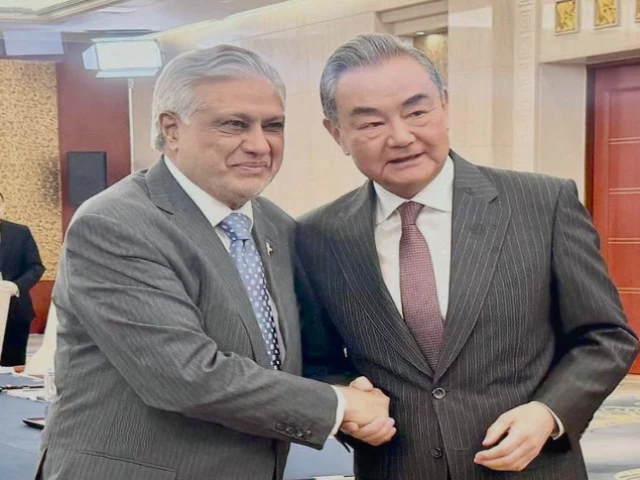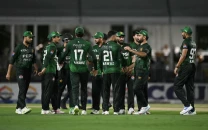Pakistan, China agree to deepen ties
Beijing offers help in agriculture, mining sectors

The foreign ministers of Pakistan and China on Wednesday agreed to further bolster their bilateral cooperation in order to promote regional peace, stability and development.
Senator Ishaq Dar and Wang Yi met on the sidelines of the Shanghai Cooperation Organization (SCO) meeting in Tianjin and reviewed bilateral ties and discussed regional and international development.
The meeting took place before Dar wrapped up his three-day trip to China where he went to attend the SCO Council of Foreign Ministers meeting.
A statement issued by the Foreign Office said Deputy Prime Minister and Foreign Minister Senator Mohammad Ishaq Dar met Chinese Foreign Minister Wang Yi reaffirmed the two countries' commitment to strengthen their strategic partnership.
Dar congratulated Wang Yi on the successful hosting of the SCO foreign ministers' meeting and expressed gratitude for the warm hospitality extended by China during the event.
The two leaders held extensive discussions on issues of mutual interest, including progress on the China-Pakistan Economic Corridor (CPEC) and enhanced multilateral cooperation.
Underscoring the significance of the Pakistan-China All-Weather Strategic Cooperative Partnership, both sides expressed satisfaction over their ongoing close collaboration across various fields.
They also reiterated their resolve to further bolster bilateral ties to promote regional peace, stability, and development.
The two ministers also discussed the upcoming visit of Prime Minister Shehbaz Sharif took China.
The prime minister is set to attend the SCO heads of governments meeting in late August but he will also meet President Xi Jinping.
According to officials familiar with the development, the prime minister will be accompanied by Field Marshal Syed Asim Munir.
The upcoming trip by Pakistan's top civil and military leadership carries added significance in the wake of the four-day military conflict with India during which Pakistan gained the upper hand, with its air force shooting down six Indian fighter jets, including the French-made Rafale.
The conflict drew attention to China's military hardware, with several Western capitals closely monitoring the developments in South Asia. Chinese-made J-10C fighter jets and beyond-visual-range PL-15 missiles played a critical role.
However, it was Pakistan's indigenous systems integration that made the Chinese hardware even lethal.
During a recent visit to Pakistan, the chief of the Chinese Air Force expressed a keen interest in learning from Pakistan's combat experience and multi-domain operations.
In a related development, the Indian Deputy Chief of Army Staff recently claimed that India was engaged in a two-front conflict, while pointing out Chinese involvement in Pakistan's military success.
Pakistan procures 80 per cent of its military hardware from China.
However, the Pakistan army chief at a recent Corps Commanders' meeting clarified that the May conflict was "unmistakably bilateral".
Meanwhile, Foreign Minister returned to Islamabad after concluding a successful two-day visit to China for the SCO Council of Foreign Ministers, according to his office.
In addition to participating in the main SCO CFM proceedings and the joint call on President Xi Jinping, the DPM/FM held bilateral meetings with his counterparts from SCO member states, it said.
China's foreign minister said on Wednesday that China was willing to deepen cooperation with Pakistan in agriculture, industry and mining, as he met with his Pakistani counterpart in Tianjin, according to a Chinese statement.
China "supports Pakistan in carrying out its anti-terrorism operations" and believes Pakistan would "do its utmost" to ensure the safety of Chinese personnel, projects and institutions in Pakistan, China's Foreign Minister Wang Yi told Pakistan's Ishaq Dar.
With additional input from Reuters






















COMMENTS
Comments are moderated and generally will be posted if they are on-topic and not abusive.
For more information, please see our Comments FAQ